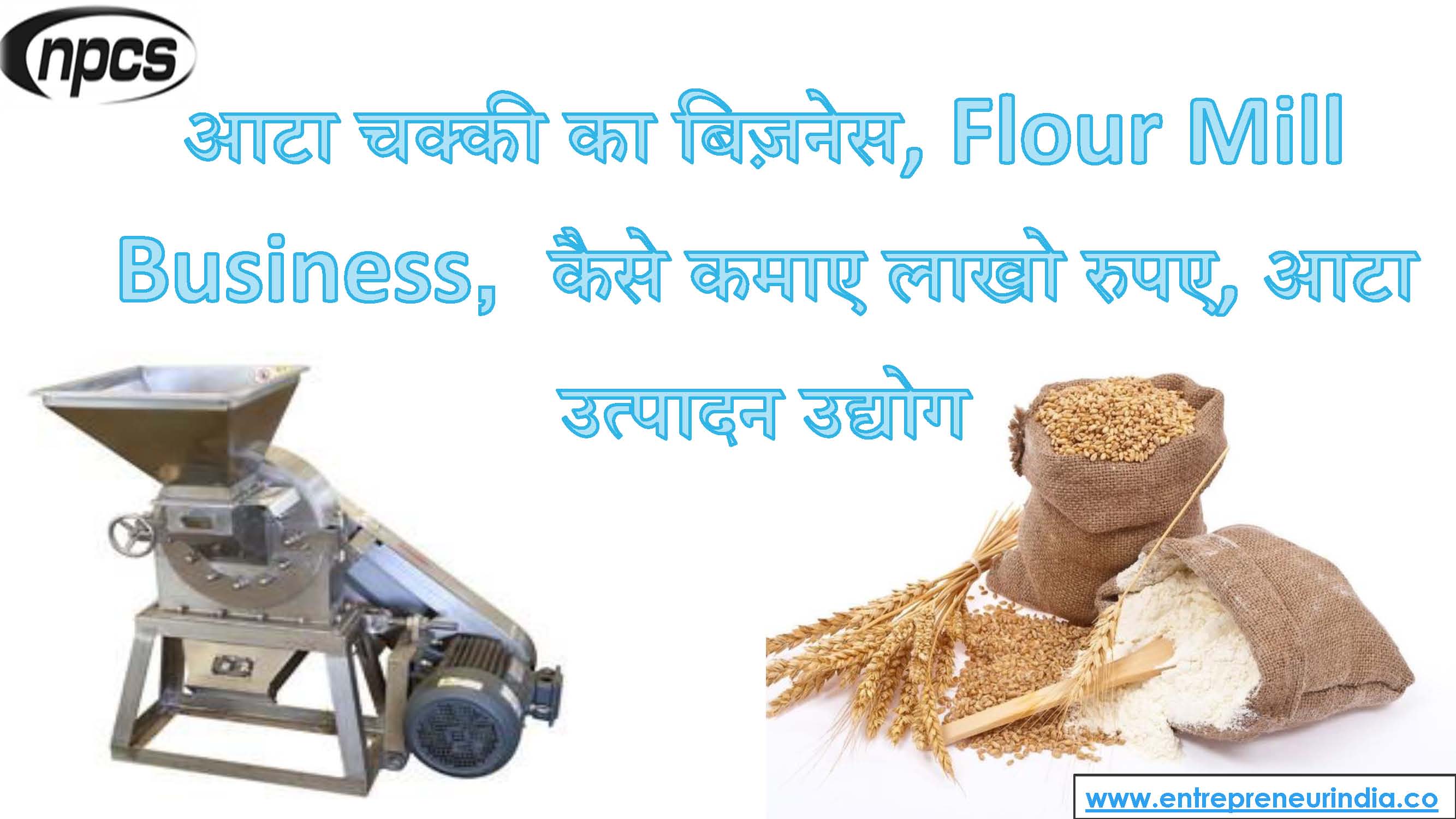
Starting a flour mill business is one of the most practical and profitable ventures in the food processing sector. With consistent demand for flour-based products across urban and rural areas, the flour milling industry has sustained stable growth over the decades. From households to bakeries and large-scale food manufacturers, flour remains a staple ingredient, making this business model resilient and scalable. Moreover, with relatively low startup costs and easy access to raw materials, entrepreneurs can enter this industry with confidence. By focusing on quality, efficient operations, and strategic distribution, one can transform a small milling unit into a flourishing enterprise.
Flour Mill Business
The flour mill business holds a significant place in the agro-processing sector due to its essential role in converting wheat and other grains into flour for daily consumption. Whether it’s whole wheat atta, refined maida, or specialty flours like rice or millet, there is a constant market for well-milled, high-quality flour. Moreover, the business can cater to a wide variety of customers—from individual households to wholesale buyers and even institutional food service providers. Its flexibility in scale and product offerings makes it an ideal choice for both beginners and seasoned business owners.
See Also:- Make Profits in Noodles and Sewai Making Business
Types of Flour Mills to Consider
One of the first decisions in starting a flour mill business is choosing the right business model. Broadly, flour mills can be classified into the following types:
-
Domestic/Small-Scale Flour Mills: These units serve local customers and operate in residential or semi-commercial setups. The investment is minimal, and profits are earned on direct sales of flour to nearby households.
-
Commercial/Medium-Scale Mills: These mills are designed to cater to local markets, retailers, and small businesses like restaurants or bakeries. They process a higher volume of grain daily and require more advanced machinery.
-
Industrial/Large-Scale Mills: These operate at a much larger capacity, supplying flour to food manufacturers, retailers, or even exporting to international markets. This model requires higher investment but yields substantial long-term returns.
Choosing the type of mill will depend on factors like investment capacity, target market, and available space. Each model offers unique advantages and different profit margins.
Machinery and Infrastructure Requirements
To run a successful flour mill business, selecting the right machinery is crucial. The machinery you choose directly affects the quality, texture, and volume of your flour. Common equipment includes:
-
Cleaning Machines – to remove stones, dust, and other impurities from the grains
-
De-stoner and Magnetic Separator – for further purification
-
Grinding Machines or Rollers – to mill the grains into fine or coarse flour
-
Sieving Equipment – to separate flour based on fineness
-
Packaging Machines – to ensure hygienic and efficient packaging
In addition to machinery, your infrastructure should include a proper production area, storage space for raw materials and finished goods, quality control room, and administrative office. Proper ventilation, dust control, and hygiene practices are essential to ensure a safe and productive environment.
See Also:- Products from Fruits and Vegetables
Raw Materials and Supply Chain
The most important raw material for a flour mill business is grain—primarily wheat, but also maize, rice, bajra, and other millets depending on your product line. It’s vital to establish reliable procurement channels, either through direct contact with farmers or through grain wholesalers.
Moreover, building relationships with suppliers can help you secure better prices and consistent quality. You’ll also need to stock food-grade packaging material, labels, and any preservatives or additives, if required by your specific product.
Transport logistics play a crucial role in your supply chain. Efficient delivery systems for both incoming raw materials and outgoing finished goods can greatly influence your profitability and reputation.
See Also:-Production of Ferrous and Non-Ferrous Metals
Legal and Regulatory Compliance
Starting a flour mill business involves a few mandatory registrations and licenses to operate legally in India (or most other regions):
-
FSSAI License – mandatory for any food-related business
-
GST Registration – required for tax compliance
-
Factory License (for larger units) – if employing labor or operating heavy machinery
-
Trade License – from your local municipal body
-
Udyam Registration – to register as an MSME and avail government schemes
Additionally, you must follow food safety regulations and good manufacturing practices (GMP). Periodic quality checks and maintaining batch records help build trust with customers and regulatory bodies alike.
See Also:-Profitable Projects on Food or Beverage Processing
Branding, Packaging, and Market Strategy
To thrive in the flour mill business, you must go beyond production and focus on branding and marketing. Whether you’re targeting households or retail chains, consumers often associate packaging and labeling with product quality.
Ensure your packaging is:
-
Airtight and tamper-proof
-
Food-grade and eco-friendly
-
Informative with nutritional facts, manufacturing/expiry dates, and FSSAI logo
Create a unique brand identity with a name that reflects purity and trust. You can promote your products through:
-
Local grocery stores and supermarkets
-
Online marketplaces like Amazon or BigBasket
-
Social media and regional advertising
-
B2B sales to restaurants, caterers, and food manufacturers
Offering samples or initial discounts helps in capturing early customers. Once trust is built, repeat business becomes a reliable source of income.
Profitability and Cost Analysis
One of the primary reasons to invest in a flour mill business is its attractive profit margins. Let’s break down the basic economics:
Estimated Initial Setup Cost (Small-Scale Unit):
-
Machinery: ?2–5 lakhs
-
Setup/Rent: ?1–2 lakhs
-
Raw Material (initial): ?1 lakh
-
Licenses and Admin: ?50,000
-
Packaging and Branding: ?50,000
Total Estimate: ?5–9 lakhs
Monthly Operating Costs:
-
Raw materials: ?1.5–2 lakhs
-
Labor: ?25,000–?50,000
-
Electricity and Maintenance: ?10,000–?20,000
-
Miscellaneous: ?10,000
Revenue Potential:
-
Average sale price: ?30–?45/kg
-
Production volume: 1000 kg/month (small scale)
-
Estimated Monthly Revenue: ?30,000 to ?45,000
-
Monthly Profit (after expenses): ?15,000 to ?25,000 (small-scale); much higher in medium/large scale
As you scale and build loyal customers, profits can easily double or triple with increased volume and better pricing.
Growth Potential and Future Trends
The flour mill business is no longer limited to just atta and maida. Consumers are now more health-conscious and actively seek options like:
-
Multigrain flour
-
Gluten-free flour
-
Organic wheat flour
-
Traditional grains like ragi, jowar, and bajra
By diversifying your offerings, you can tap into the premium segment and increase margins. Additionally, packaging innovation (resealable pouches, bulk packs) and digital marketing can help you scale faster.
There is also growing export potential for high-quality flours and health blends, especially from India to the Middle East, North America, and Southeast Asia.
Government schemes under the MSME sector and agricultural support policies further make it easier to access subsidies, machinery loans, and training programs.
Conclusion
To sum up, the flour mill business offers a rewarding path for those looking to enter a stable, high-demand industry. With strategic planning, efficient operations, and focus on hygiene and branding, even a small unit can generate sustainable profits. As consumer preferences evolve toward healthier and traditional food choices, the opportunities within this space continue to grow. Whether you’re starting with a local unit or planning a full-fledged commercial setup, this business holds solid potential for long-term success and expansion.





